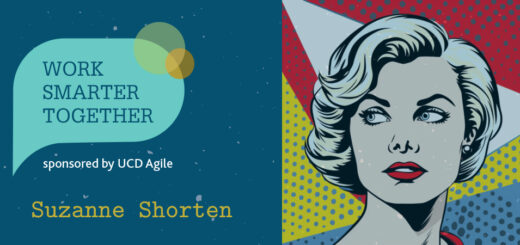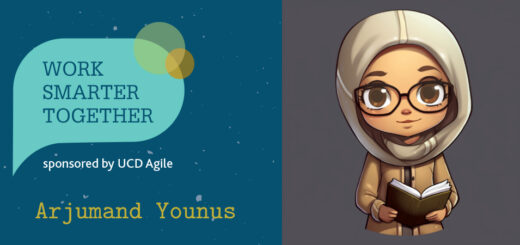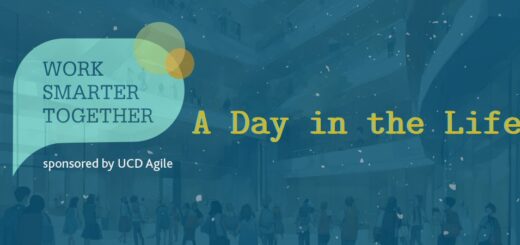A Day in the Life with Lisa Padden
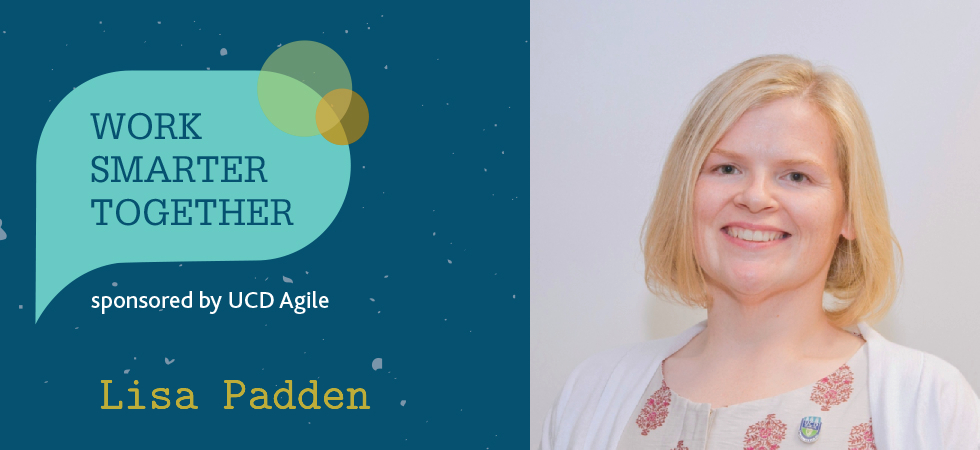 Who are you?
Who are you?
I am Lisa Padden, the Programme Manager for University for All which is UCD’s whole-institution approach to access and inclusion. I’ve worked in UCD for over ten years and run a number of institutional and national projects which seek to embed our key message – access and inclusion is everyone’s business.
How did you get here? What was the journey to UCD?
Before joining UCD in 2012, I worked in the University of Galway (it was NUIG then!) in the School of English. Being from Belmullet, Co. Mayo, Galway was the closest university so was the obvious choice. I started my undergraduate degree in 2002 and studied English and Psychology. I went straight on to do a Masters in Literature and Publishing in 2005 and began my PhD with the School of English in 2006. I was awarded a teaching fellowship and was fortunate enough to have full funding for my doctoral studies and completed my PhD in 2010. I worked as a tutor, teaching assistant and occasional lecturer throughout my PhD and stayed on in this capacity until 2012 when I started in UCD as a Learning Support Tutor. After a year in that role I became Academic Skills Coordinator before changing role to Inclusive Education Coordinator. In these roles I worked as part of the Disability Support team in UCD Access & Lifelong Learning. While in this role I also began working on the University for All initiative with the unit’s director Dr Anna Kelly. We started this work in 2017 and I wore two hats until 2020 when Dr Kelly was successful in securing support for a dedicated role of Project Lead for University for All. After a year in this role I became Programme Manager for University for All and began building my team.
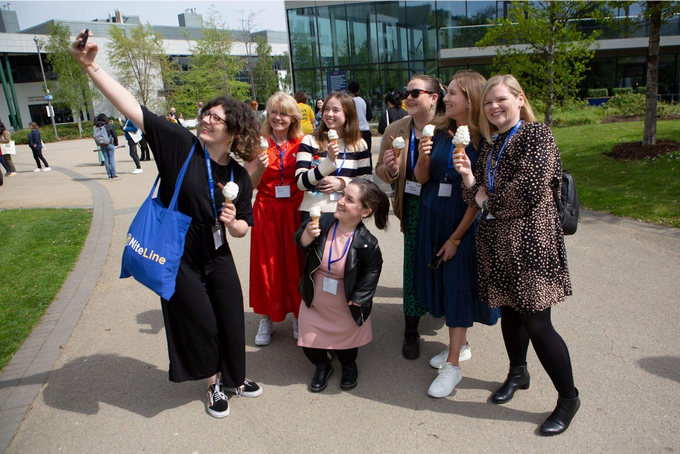
Image: Members of the UCD Access & Lifelong Learning team at the recent University for All Symposium. Left to Right: Emily Smith, Michelle Tracey, Lucy Kelly Crimmins, Ailbhe King, Kim Lombard, Ciara McHale, Lisa Padden
What is your role within UCD, and what are your main responsibilities?
As Programme Manager, I lead the implementation of University for All in UCD. My team includes a Project Officer, Project Assistant and Instructional Designer.
Could you briefly describe what a typical day looks like for you?
I’m sure it is cliche but there really is no typical day in the University for All initiative. We are running a number of projects internally and externally and this means on any given day we could be running an event, hosting a community of practice, travelling to another HEI or running a variety of online workshops or meetings. Much of our work happens online as we are collaborating with colleagues across the country and the move to hybrid working has meant we can do this very efficiently using Zoom, Google Drive and other online tools. We are in touch with students, staff and faculty daily regarding Universal Design, inclusion and the embedding of the University for All initiative across UCD. I also work closely with AHEAD on the national roll outs of our Digital Badge for Universal Design in Teaching and Learning. Each year we have over 1,000 educators across the country undertake this digital badge and I lead a team of almost one hundred local facilitators in Education and Training Boards and Higher Education Institutions across Ireland.
What are some of the most interesting or challenging tasks you encounter on a regular basis? Why are they unavoidable?
In a large-scale change initiative like University for All, it is inevitable that we will come across new and varied challenges continually. Our goal is to change people’s mindset and work practices and this takes time and a continuous effort to find new and creative ways to persuade people to invest their limited time and resources into building inclusion. Professional development opportunities are vital to help us achieve this goal and finding ways to deliver this to time-poor colleagues is certainly a challenge.
Are there any specific projects or initiatives you or your unit are currently working on that you would like to share?
This Spring we launched a short online professional development programme – Introduction to Universal Design in UCD. This training programme should take only about an hour and is in three sections making it easy to complete in sections or all together. All colleagues are already enrolled in the Brightspace module where the training is housed and will be awarded a badge through Brightspace upon completion of the training and the accompanying survey questions which ask you to reflect on how Universal Design relates to your own work. We worked with a phenomenal steering group of colleagues from all across UCD to develop this training and ensure that it is relevant to everyone. This is a simple way to start embedding inclusion in your work and learn about how Universal Design can help to embed inclusion in your area.
Is there a process or element of your work that you would improve or change?
We have done a significant amount of work on developing our approach to data democratisation over the last five years in particular. We have now provided an in-depth analysis of access, participation and outcomes for our diverse student population through the Who Counts? Institutional and disaggregated reports. Long term we would like to see more reports integrated into the University Systems so all colleagues could access these as live dashboards rather than a static annual report.
Could you share a memorable experience you’ve had while working in your role?
Reaching the milestone of 3,000 educators across Ireland being awarded the Digital Badge for Universal Design in Teaching and Learning was phenomenal. Seeing the reach of this work and the ongoing positive impact for students continues to be exceptionally rewarding.
Is there a particular skill or expertise that helps you in your role and what advice would you give to someone joining your unit?
At its core my role requires two core skills: change management and Universal Design. For both good communication and problem-solving skills are vital. I deal with varied audiences and could be switching from a student focus group to a national high-level stakeholder meeting so it’s important to be adaptable and responsive to the varied needs of each audience. Ultimately we have to be able to speak the language to which people will listen. It’s important to be able to quickly assess the audience and use the methods with the highest possibility of success. For some, that might be sharing student testimonials, having students come and deliver content, presenting data and statistics or showing progress relative to other disciplines or institutions. Sometimes change management is akin to sales and we have to have a pitch to suit each person.
For others who would like to work in our unit the most important thing you need is a passion for inclusion which will sustain you in this long-term work where reward and impact can be delayed.
How do you collaborate with other teams or colleagues in your day-to-day work?
The University for All initiative wouldn’t work without collaboration. In UCD we collaborate with the Widening Participation Leads in every area of the university to embed University for All through local workshops and projects. We also collaborate with our amazing network of University for All Faculty Partners to increase awareness of Universal Design and take up of our professional development programmes. Nationally we collaborate with colleagues across the sector primarily to support work in the area of Universal Design.
Are there any common misconceptions about your role?
Some people think we are asking people to make ‘big bang’ changes straight away to every aspect of their work. This is not the case – we focus on a plus one approach which sees consistent small changes for inclusion which ultimately create a positive impact for all students.
How do you see your job changing over the next ten or twenty years?
As the higher education landscape evolves so too will our role in embedding inclusion. The National Access Plan has identified new groups under-repsented in higher education and there is a lot of work to be done nationally to support these groups to access higher education, participate equitably and achieve success.
What is an achievement big or small you’ve had while in this role?
I won’t give specific details for obvious reasons. A few years ago I was delivering training and speaking about the importance of providing slides to students. One senior colleague objected strongly to this and we had a lengthy discussion on why it was important and the ways in which it supports and scaffolds student learning. Recently I was delivering training to new colleagues in the area and this senior colleague was present. A new colleague raised concerns about providing slides and before I could answer the senior colleague stepped in and explained why it was so important and noted that they had been doing it with great success. This was a full-circle moment and demonstrated the power of delivering training in a supporting and empowering way. Universal Design is a mindset rather than a prescriptive framework and we always keep this in mind when colleagues debate the merits of specific inclusive practices.
If your job had a theme song or soundtrack, what would it be [and why]?
This is Me – Keala Settle (The Greatest Showman)
This was a very difficult question! I’ve gone with This is Me – in an inclusive environment all students, staff and faculty should be able to feel comfortable to be themselves fully and feel accepted and valued. This is our ethos in University for All. This is also part of my management philosophy – all team members should bring their authentic selves to work every day and be unapologetic about it.

